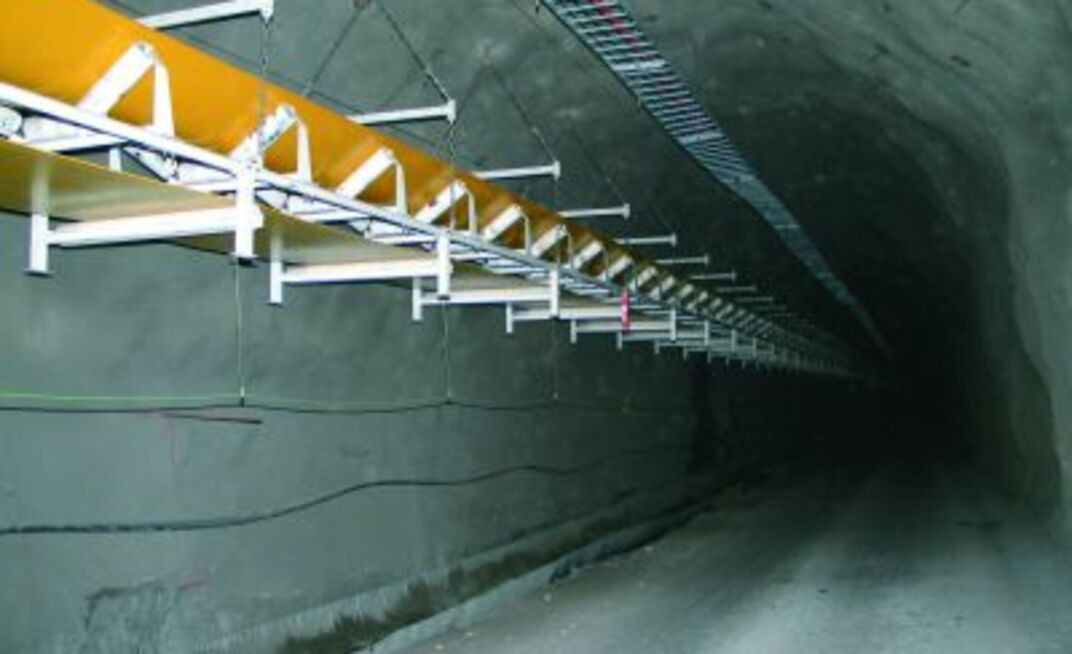Published in Australian Longwall Magazine
As the world’s most northern underground coal mine, the Svea Nord longwall mine has its share of unique challenges. These include long periods of being ice-bound when ships cannot navigate the port, transporting coal over moving glaciers and summer floods when the icecap melts.
The mine’s coal transport system was, until recently, one of these problems. Coal was brought to the mine entrance on a five-belt conveyor system and then loaded onto trucks which transported the coal 12km to the port at Kapp Amsterdam. Some 3km of this road is on a glacier which moves one metre per year vertically and horizontally, threatening the safety of drivers.
Another problem occurs during the summer months when the icecap starts to melt and enters the mine, threatening floods. The seam being mined is located under the Boret Mountain and varies in depth from 200-400m. About 90% of the mine is covered by ice, in some places up to 280m thick.
In 2002 melting ice caused water to enter the workings at a rate of 2000 cubic metres per hour; at the time pumping capacity was only 1000cu.m/h. The longwall stood for two months with the chocks in water a few feet deep. Amazingly, once the Joy Mining Machinery longwall face was restarted it produced 265,000 tons in September and 360,000t in October.
To overcome these two key issues, last year the mine built a new tunnel using drill and blast methods. The tunnel has reduced the distance of required truck transport by 7km and significantly reduced transport costs. The tunnel is 6m high and 7m wide at a gradient of 2.6 degrees, rising 250m over its 5.6km length. The development was carried out by a Norwegian construction company with an Atlas Copco Rocket Boomer L2C drilling rig and Volvo LHD.
A new Continental Conveyor (UK) system has been installed in the tunnel. This system is suspended from the roof, ensuring no water ingress. The 2000t per hour capacity belt has a 35-degree trough angle, belt width of 1400mm and belt speed of 3 metres per second. The tunnel is also used for transporting staff into the mine using commercial Toyota vehicles.
In addition to providing a transport route for coal and manning, the tunnel serves a critical role in drainage for the mine. The tunnel rises 280m from the inlet of the tunnel to the lowest point in the mine (this is where the tunnel meets the mine), ensuring the mine is self-drained.
The longwall is on target for a full year production of 2.7 million tons. The longwall equipment has been transferred from the second to the third panel and a new conveyor system installed in the tunnel.
New equipment has also been ordered incorporating one ABM 25 bolterminer; two Joy 10 SC shuttlecars; one Fletcher roofbolter; one Stamler feeder breaker and electrical equipment. A new Joy 7LS shearer and two new Joy roof supports have also been ordered which will be delivered to the mine in the fourth quarter of 2004.
Recently, the mine placed its first order for a Huesker mesh system with Australian company NBW Mining for the next longwall recovery.
“Although they won't use the Huesker until May, we have to get the Huesker System to minesite before the end of October before the sea freezes,” said NBW director Nick Wills.
The mine has a shipping window from July to November when ships are able to navigate the fjord. This is when key equipment must be brought in and coal exported.
This year the fjord stayed frozen for longer than usual, however the ice has finally melted and the first export ships have arrived.
“It looks like we will go into a hectic shipping season that will last to the end of November,” said Harry Higraff, Svea Nord technical director.
At the time of going to print the mine had just set a new daily production record of 26,346t.
Store Norske Spitsbergen Grubekompani is a wholly-owned subsidiary of 99.9% state-owned company Store Norske Spitsbergen Kulkompani A/S (SNSK), part of the Store Norske Group of companies.
























